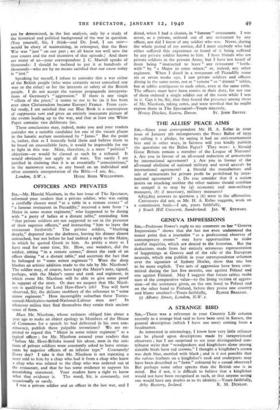OFFICERS AND PRIVATES
Sut,—Mr. Harold Nicolson, in the last issue of The Spectator, informed your readers that a private soldier, who was eating a carefully chosen meal " at a table in a remote corner " of " a famous restaurant in Piccadilly," received a note from " a Major in some minor regiment," who happened to be dining with " a party of ladies at a distant table," reminding him " that private soldiers are not supposed to eat in the presence of their superior officers," and instructing " him to leave the restaurant forthwith." The private soldier, " blushing deeply," departed into the darkness, leaving his dinner almost untouched, but not before he had indited a reply to the Major, in which he quoted Greek to him. As pretty a story as I have read for some time, Sir. How, one wonders, did the soldier, sitting " in a remote corner," detect the rank of an officer dining " at a distant table," and ascertain the fact that he belonged to " some minor regiment "? Were the deep blushes an artistic addition made to the tale by Mr. Nicolson? The soldier may, of course, have kept the Major's note, signed, perhaps, with the Major's name and rank and regiment, in which event Mr. Nicolson will be able to give some proof in support of the story. Or dare we suspect that Mr. Nicol- son is qualifying for Lord Haw-Haw's job? You will have observed, Sir, the delicate snobbery of the reference to " some minor regiment." How incorrigibly suburban these Tories- turned-Mosleyites-turned-National-Labour men are! In whatever milieu they find themselves they retain their ancient sense of form.
Must Mr. Nicolson, whose rashness obliged him about a year ago to make an abject apology to Members of the House of Commons for a speech he had delivered in his own con- stituency, publish these palpable inventions? We are ex- pected to regard this " Major in some minor regiment " as a typical officer ; for Mr. Nicolson assured your readers that " before Mr. Hore-Belisha issued his ukase, men in the uni- form of private soldiers were constantly asked to leave restau- rants by superior officers of an inferior type." Constantly! Every day? I take it that Mr. Nicolson is not repeating a story told to him by a chap who had it from a chap who knew a chap who was related to the chap who was ordered out of the restaurant, and that he has some evidence to support his astonishing statement. Your readers have a right to know
what that evidence is. The word, Sir, is constantly, not occasionally or rarely.
I was a private soldier and an officer in the last war, and I dined, when I had a chance, in " famous " restaurants. I was never, as a private, ordered out of any restaurant by any officer, nor did I know of any soldier who was. Never, during the whole period of my service, did I meet anybody who had either suffered this experience or heard of it being suffered by any private soldier known to him. I have friends who are private soldiers in the present Army, but I have not heard of them being " instructed to leave " any restaurant " forth- with " by " a Major in some minor," or, indeed, any other regiment. When I dined in a restaurant off Piccadilly some six or seven weeks ago, I saw private soldiers and officers dining in the same room, not at " remote " or " distant " tables, but at tables contiguous to each other, even at the same table. The officers must have been remiss in their duty, for not one of them ordered a single soldier out of the room while I was in it. Can it be, Sir, that they feared the presence among them of Mr. Nicolson, taking notes, and were terrified that he might expose them in The Spectator?—Yours sincerely, Honey Ditches, Seaton, Devon. ST. JOHN ERVINE.


































 Previous page
Previous page